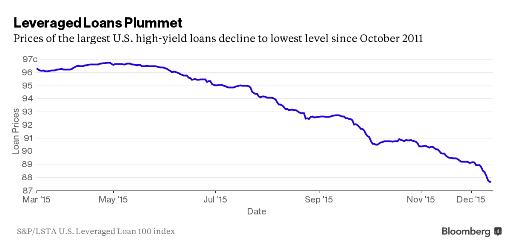With junk bonds finally reverting to their intrinsic value, the question on everyone’s mind is “what blows up next?” Here’s the first in what might be a long, painful list:
CLOs Hammered as Energy Rout Plays Havoc With Other Markets
(Bloomberg) – The bust in commodities that’s roiling junk bonds is also taking its toll on funds that bundle corporate loans used to finance buyouts.The riskiest slices of collateralized loan obligations raised after the financial crisis plunged 9 cents on the dollar since September to about 58 cents at the end of last month, down from 84 cents a year ago, according to JPMorgan Chase & Co (N:JPM). Intensifying price declines in recent months have led to one of the “more challenging years in recent memory,” JPMorgan analysts Rishad Ahluwalia and Jacob Kurosaki wrote in a Dec. 11 note to clients.
CLOs purchase high-yield, high-risk loans and bundle them into securities of varying risk and return. Investors in the lowest-ranked CLO slices, also called the equity tranche, are first in line to absorb any potential losses. The sell-off comes amid concern about the creditworthiness of speculative-grade borrowers as volatility spreads beyond the energy sector.
“The price declines are alarming and worrying,” Ahluwalia, JPMorgan’s head of global CLO research, said in a telephone interview.
While CLO equity holders have continued to receive cash flow payments, the price drop signals investors are worried that their returns are imperiled by “stress” in the corporate credit markets, according to London-based Ahluwalia.
A retreat by CLO equity investors, who typically include hedge funds, will make it more difficult for managers to raise new investments, Ahluwalia said.
CLOs, being packages of crappy loans, are kissing cousins of junk bonds (which are individual crappy loans). So trouble in the latter would be expected to coincide with trouble in the former, which means the crisis hasn’t yet moved far afield. But that’s how these things work. For a localized bust to become systemic, it has to blow up the similar stuff before it can progress to instruments that aren’t directly related.
What’s next in line? Emerging market anything certainly, since there’s still that $9 trillion of dollar carry trade debt waiting to implode. And mid-range bonds — better than junk but worse than Treasuries — are certainly due for a revaluation. The question is where the dividing line will form between bonds that attract worried capital and bonds that repel it.
And then, inevitably, are the broad equity indexes. The dirty little secret of both junk bonds and equities is that they tend to behave in similar ways. One can, in fact, think of junk bonds as the equity of high-yield borrowers because when borrowers get into trouble their debt is frequently converted to equity.
A more complex question is what happens to the other holdings of hedge funds that are now being burned by junk and CLOs. Presumably they’ll have to raise cash by selling things that still have markets, which means they might end up dumping their higher-quality assets. Think about it: If you own some Google (O:GOOGL) stock near its all-time high and some junk bonds worth maybe 20 cents on the dollar — assuming anyone will buy them at any price — which is a better source of ready cash?
In short, if junk is imploding, stocks can’t be far behind.

